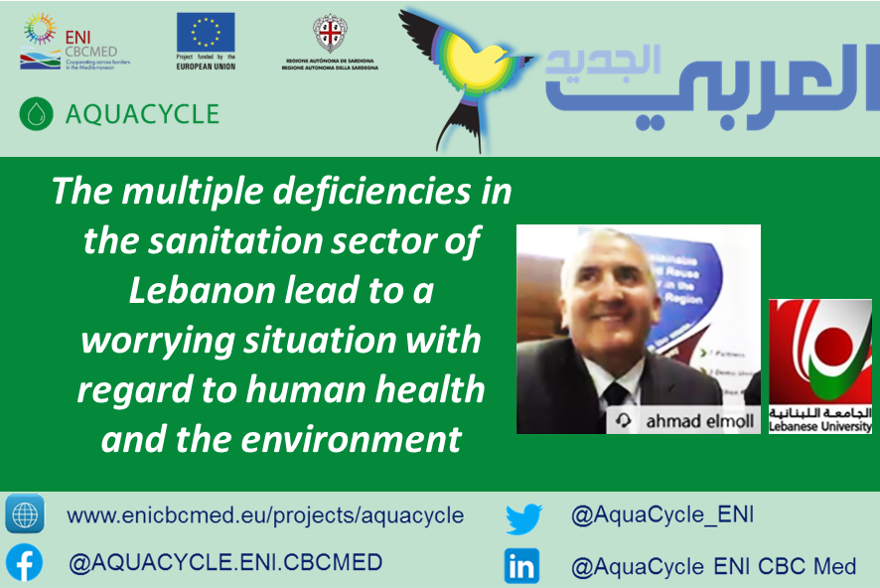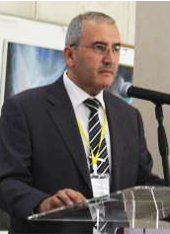AQUACYCLE highlights importance of decentralized wastewater treatment in interview with Al-Araby Al-Jadeed news channel

Lebanon annually produces 450 million cubic meters of wastewater of which 350 million cubic meters are domestic wastewater. The number of wastewater treatment plants in Lebanon currently exceeds 104 stations, yet 60% of these are out of service or functioning only partially.
Although the Tripoli Central Wastewater Treatment Plant, constructed in 2006, was designed with a large capacity, due to several reasons it treats only 10% of its design capacity. The treatment process of this station is limited to just the separation of solid materials from liquid materials. The solid part of the waste stream is sent to the landfill which is located next to the station, while the liquid part is discharged into the sea without any treatment.
In this context, also the difficulty of connecting the surrounding areas to the sewer networks in general to reach the treatment plants in Tripoli should be noted.
At the same time, it can be observed that the spread of diseases first emerged in the refugee camps in Bebnin, governorate of Akkar, and the refugee camps of Arsal in the Bekaa Valley. This is due to the reliance on cisterns to dispose of sewage and the reliance of some farmers on irrigating crops with contaminated water, in addition to the process of filling sewage into bowsers to be discharged into streams or into the Mediterranean sea.
The Minister of Health says the main reason for the spread of cholera in Lebanon is the contamination of some water sources due to the shutdown of pumping and refining stations due to power outages, and also because some people relied on irrigating crops with contaminated water. (https://www.tayyar.org/News/Print/504630)
To my point of view, the three main elements responsible for the poor situation in the wastewater sector in Lebanon are:
First, the predominance of mountainous relief over most of Lebanon and the density of buildings in areas formerly assigned to agricultural activities.
Second, the population is concentrated along the coast, resulting in a high population density and a high rate of urbanization which is as high as 86%.
Third, the calcareous nature of the rock in Lebanon, i.e. limestone, which presents a great danger in terms of pollution of groundwater resources. Where sewage enters the ground, it is transported through open fissures and conduits (which are typically large to very large in karst terrains), thus directly leading to the pollution of the aquifers, i.e. the groundwater bodies. Hence the necessity to treat wastewater on site.
This deterioration of the environmental situation occurs in a context where Lebanon is linked to the countries of the Mediterranean basin by international treaties aimed at protecting the marine ecosystem. Lebanon is required to respect international obligations, in particular the Barcelona Convention for the Protection of the Mediterranean Sea against Pollution, in the context of contributing to sustainable development.
At the local level, the recent health and environmental crisis highlights these negative effects: rivers, natural springs and groundwater aquifers are negatively affected by untreated sewage and other domestic and industrial waste that is dumped without supervision or regulation.

This situation is worrying, especially in light of the magnitude of the negative impacts on human health and the environment.In fact, the multiple deficiencies of the sanitation sector in Lebanon, in terms of low rate of connection to the sewage network, low rate of wastewater treatment and absence of a culture of exploitation and maintenance of structures, lead to a worrying situation with regard to human health and the environment.
The adoption of decentralization in the treatment of waste water brings an appropriate solution to reduce the likelihood of pollution of underground and surficial waters and to protect the health of citizens.
Thus, I hope to have demonstrated the importance of the ENI CBC Med AQUACYCLE project. Through this EU funded project, the Lebanese University is establishing a pilot treatment plant composed of several stages. Its first stage consists of an Anaerobic Digester, followed by a Constructed Wetland, and finally a Raceway Pond Reactor for disinfection so that the treated water is safe to use for the irrigation of trees and root crops. Through this pilot treatment plant, the project aims to highlight this treatment process as a model station applicable in the Mediterranean region.
The interview of Prof Ahmad ElMoll, who is Teamleader of the Lebanese University in the AQUACYCLE Partnership, with Al-Araby Al-Jadeed (https://www.alaraby.co.uk/) took place on 24 October 2022.









